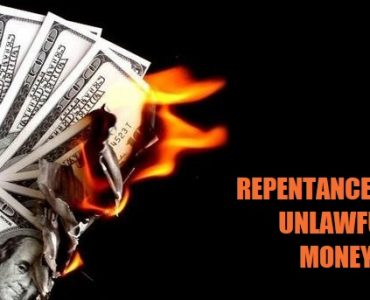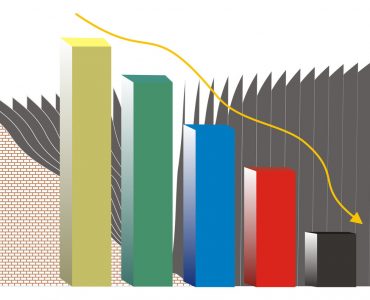The term used to define usury in the Quran is riba. Riba(الربوا) or (الربا) in their infinitive form stand for ‘add’ and ‘increase’ while in their noun form they do become addition or usury[1].
Usury is the incoming obtained from a loan. The increase, the riba obtained from the loan is usury, due to the fact it is the economic deal it relies on. In a verse revealed in Mecca the Glorified Allah commands:
وما آتيتم من ربا ليربو في أموال الناس فلا يربو عند الله
وما آتيتم من زكاة تري دون وجه الله فأولئك هم المضعفون
No one besides those who posses more capital than they need can give loans. Loans with usury interest are given “so that it may increase in the property of men…”. For this reason they cannot be given to people who maintain little property.
The person who offers loans with usury in order to be assured that he will get back his money and the usury percentage requires guarantee. Thus he releases himself from the risk of guarding his capital. The reasons that make a loan-taker to overtake the usury difficulty might be his desire to increase his capital or the urgent need for money.
Considered similar to the rent income, usury is defined as the ‘value of money in time’. The rent for a property is the monetary compensation for the benefiting from a property without consuming it. Those who rent a house, sit in it. Those who rent a car, drive it. The property is given back to its owner when the agreement between the two sides ends. No property which cannot be benefited from without consuming it can possibly be rented. For example, money itself cannot possibly meet any necessity. Even if he were the owner of an enormous treasure, a man would die if he wasn’t fed. Money can be neither his food nor even his shelter. In order to profit out of money you have to exchange it with goods or services by consuming it. Thus, such a property cannot be rented and following the non-rentable property does not maintain a ‘value in time’.
Usury loaners maintain that someone who is need today may happen to make money in the future. Someone else might assure money he is not able to use for the moment. If usury is allowed, the loan-giver would help the person in necessity hoping to gain more money. While the loan-taker would generously pay back his loan when obtaining his money. Thus, money would not be absurdly preserved, and both sides would profit out of it.
The clause ‘whatever you lay out as usury, so that it may increase in the property of men, it shall not increase for Allah…’ means that ‘capital and money does not increase
according to the natural order –fitrat- of the market as the loan is no economic deal pursued to increase the incoming. Income is achieved by the investment of the loan by the loan-taker. Loan is no investment. The usury dealer overtakes no responsibility in the investment of the loan, so he possesses no right in the possible income made out of this investment.
Usury is mostly considered similar to trade. If the selling of a good, which costs 10$ in cash at the moment, for 11$ in a month credit is acceptable, then the selling of 10$ for 11$ in a month’s time is acceptable as well. On the contrary, trade is the exchanging of two different goods, as the offering of money to buy bread is. It might be in cash or in trust/ credit. On the other hand, the usury deal is the profiting of income out of a loan. The profiting of income from a loan is totally different from trade. This issue will be analyzed in a different chapter.
Usury is always done with the same method. The Arabs living in the Arabic peninsula before the revelation of Islam are called the Arabs of the Ignorance Period. They gave loans without using their main capital and in order to obtain an income out of the given loan. When the agreed period was over, they asked for their loan and the interest. If the loan-taker could not pay his loan, a new interest was asked for the prolonged period.
If the loan was the result of credit purchase the owing person was asked if he would pay or if he wanted to increase. If he was not able to pay the loan amount was increased for a new future payment timEe The Messenger of Allah in his Farewell Speech emphasizes:
وربا الجاهلية موضو ع. وأول ربا أضعه ربانا ربا عباس
بن عبد المطلب، فإنه موضوع كل ه.
“The usury of ignorance (period) has been removed. The first interest I removed was our interest, Abbas b. Abdulmuttalib’s interest. It has been entirely removed. ”
The Ignorance Period usury is the same as the usury today; the income is provided by the loan. The listeners of the speech being witnesses of the Ignorance Period needed no explanation for the expression ‘ignorance usury’.
According to the following verse usury is the offering of a conditioned loan, which is paid back with interest.
“…If you repent, then you keep your capital. Neither will you make (others) suffer injustice, nor will you be made to suffer injustice. (Al-Baqara/The Cow 2/279)
Capital is the term used to define the object or amount given in loan. Trade is the exchange of two different things so it cannot be defined as capital. If something is offered to be paid back with interest, the interest is usury. The following verse clarifies that usury is produced as a result of the loan as an economic deal.
“If the debtor is difficulty, then let there be postponement until he is in ease. And it is better for you that you remit (it) as gifts. Only if you knew.” (Al-Baqara/The Cow 2/280).
According to the account the Messenger of Allah claimed as following. Ibn Abbas said that Usame bin Zeyd let him know that the Messenger of Allah claimed.
(إنما الربا في الدي ن)
“Usury is produced only from the loan.”
(لا ربا فيما كان يدا بي د)
“There is no usury in instant (cash) payments.”
(إنما الربا في النسيئ ة.)
Credited payments do include usuy.
Another word of the Messenger of Allah has been reported to be as following:
(لا ربا إلا في النسيئة)
Usury is only when the loan has been credited.
The verses and hadiths clearly demonstrate that usury is the incoming assured through loan.







Add comment